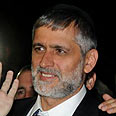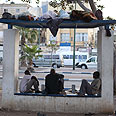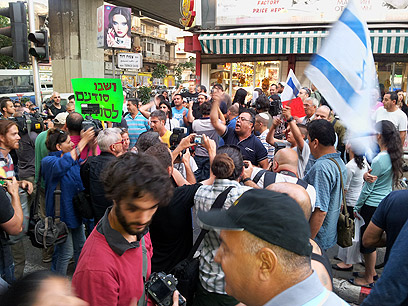

Among the tens of thousands of asylum seekers and African migrants living in Israel – an estimated 60,000 people – the number of South Sudanese citizens is minor: Some 1,500 people.
Thus, the fact that the court last week greenlighted the deportation of residents of South Sudan will not affect the majority of infiltrators that arrive in Israel from Eritrea and north Sudan.
Related stories:
- Migrant suspected of molesting teenage girl
- Protest: 'Refugees are not cancer'
- Yishai forms special taskforce to tackle migrant problem
Yet Interior Minister Eli Yishai still believes that this is just the first step. "As for the Eritrean citizens, I haven't given up yet," he said Sunday in an interview with Ynet. "I met with the Eritrean ambassador to Israel who told me of the situation there, and the situation there is good. Security wise, it is no more dangerous than Sderot."

Yishai:'Some said my plan was inhumane' (Photo: Gil Yohanan)
Yishai seemed somewhat satisfied over the last few days. The joint plan created by him and the prime minister to solve the infiltrator problem, called the "Yishai Plan," is going ahead in spite of the criticism it has faced.
The plan calls for an acceleration of the completion of the southern border fence, construction of holding facilities along the fence, sanctions against those who employ migrants and finding a legal solution to deport them.
'No migrants in periphery'
"Quite a few people fought me (on the issue), even within the government," he said. "There were ministers who said my plan was inhumane and that it wouldn't work, but now they all support me. The change in opinion stems from the support it (the plan) has received from Benjamin Netanyahu."
According to Yishai, the next phase in the plan is finding a way through which tens of thousands of Eritrean and Sudanese citizens will willingly return to their countries or, against their will, to a third country. "I want to get to a situation where infiltrators are not walking around the periphery cities," he stressed.
"If we don't stop it, what happened in Tel Aviv and Eilat will happen throughout the country over the next few years. This is why I want everyone to be in holding facilities. That way they'll prefer to go home."

Anti-migrant protest in Tel Aviv (Photo: Moti Kimchi)
Last week, the Population, Immigration and Borders Authority announced that it would give south Sudanese citizens one week to leave the country voluntarily, but on Sunday, three days after the announcement, eight south Sudanese were arrested.
"Even those that are in hiding will be captured," Yishai said, adding "the first plane of south Sudanese will leave Israel as early as next week."
An option of reaching an agreement with a third country to receive the tens of thousands of infiltrators has recently been raised but an official within the Foreign Ministry recently told Ynet that no country would be willing to accept them.
Paying for UN's failure
Minister Yishai refuses to accept that: "Let's set things straight… there are 300 million people living in countries within the Nile basin in horrific economic and security conditions. The $500 that they earn in Israel every month is an annual salary in their countries of origin.
"If the situation continues and encourages even 1% of them to come here – there goes the country. That is why I have expressed myself so sharply from the start on closing the gates."
Since 2005, when the stream of African asylum seekers began, Israel only approved isolated requests for refugee status. Meanwhile, Sudanese and Eritrean citizens only received group protection and stay permits.
Yishai insists that most of the Africans who arrived in Israel over the last few years are work migrants. "We questioned each person who filed a refugee request."
"They have problems in the African countries? Let the UN handle those problems. Let it handle it (the problems) better than it handled the problems in Syria. It is unacceptable that the UN is not solving these problems and we have to pay for it. I'm not the Eritrean welfare minister and not the Sudanese labor minister."
Asked whether it was not the government who was responsible for the immigration policy, and the government who gave infiltrators bus tickets to Tel Aviv and other cities Yishai said: "Democracies take time.
"I have been screaming and struggling over this issue for six years but the response was declaring that I was a racist. Building a fence and a holding facility takes years."
Yishai then spoke about his anger at human rights organizations that assist the infiltrators: "They act with hypocrisy and strive to put an end to the State of Israel's being the Jewish state.
"I gathered from the Eritrean ambassador that they promise these people employment and so they come. What will happen is that in a few years they will ask to have equal rights (to citizens)."
- Receive Ynetnews updates
directly to your desktop















